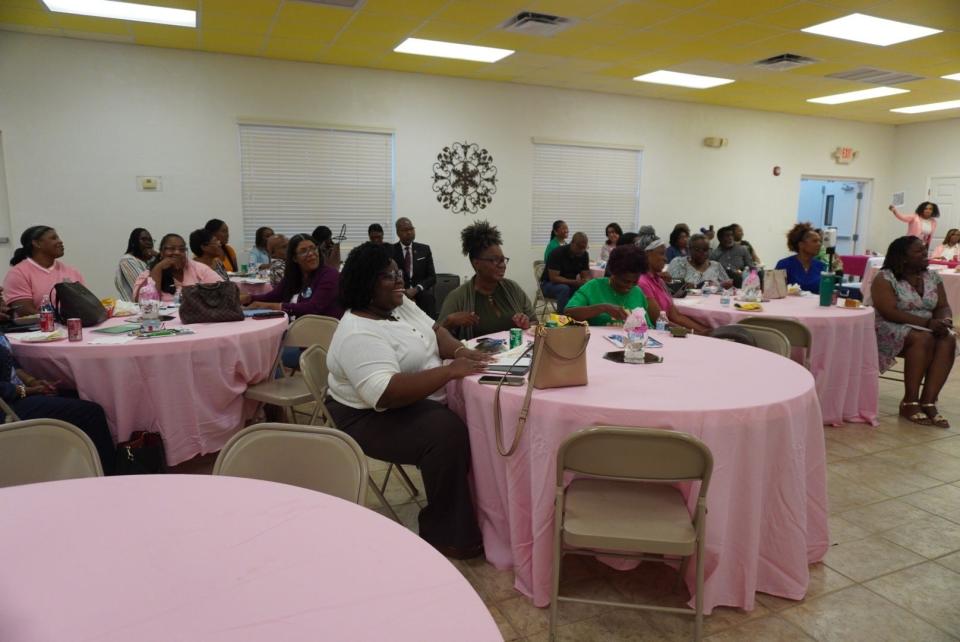Black sorority hosts home ownership workshop in Gainesville featuring property appraiser
Empowering and educating residents about home tax exemptions and how the value of homes is determined on the market was the focus of a homeownership workshop.
Sponsored by the Mu Upsilon Omega chapter of Alpha Kappa Alpha Sorority Inc.’s Build our Economic Wealth committee, the workshop was held Tuesday at Gainesville Church of God by Faith at 735 SE 15th St.
"When you build it [wealth], people must be educated to keep it and maintain it," said Faye McKnight, who co-chairs the committee with Kutonya Sowell. "It's about being proactive on the front end so you don't have to be reactive on the back end."
The workshop was inspired by the sorority's international president Danette Anthony Reed, who created the initiative two years ago, Sowell said.
The speakers during the workshop were Chris Cao, director of valuation at the Alachua County Property Appraiser's office, and Lally Gomez-Roberts, director of public service and exemptions at the appraiser's office.
Providing information to the community is key for them to be knowledgeable about what they can do as homeowners, said Alachua County Property Appraiser Ayesha Solomon.
"It is important for us to make sure people are informed as property owners and what they are entitled to do," Solomon said.
Guardian Newsletter: Gainesville Guardian will transition to an email newsletter format
The purpose of the property appraiser's office is to determine the value all of the property in Alachua County and to administer all the property tax exemptions in an equitable manner, Cao said.
The office estimates value through three approaches - the cost approach, sales comparison and income approaches, Cao said.
The five things that drive value on a property are the location, improvement size, quality grade, construction materials and the effective age, Cao said.
Cao also talked about the Truth in Millage report which is also known as T.R.I.M. A millage is a tax rate defined as dollars assessed for each $1,000 of value.

In 1980 the Florida Legislature passed the Truth in Millage Act that was established to inform taxpayers which governmental entities are responsible for the taxes levied and the amount of tax liability taxpayers owe to each tax and authority, Cao said.
Cao also talked about capping, which is the maximum limits on various aspects of real estate transactions or investments.
Homestead properties are capped at 3% and non-homestead properties are capped at 10%. Agricultural properties are not capped, he said.
Those who disagree with the value of their property can appeal it through the internal ACPA review, value adjustment board or the Circuit Court, Cao said.
During her presentation, Gomez-Roberts talked about homestead exemptions that help Florida homeowners save money on their property taxes every year if they are eligible for exemptions and additional benefits.
To apply for a homestead exemption, a person has to establish a property as their permanent residence and provide a Florida's driver's license or ID card and make sure previous addresses have all been updated and have a utility bill in their name showing usage for the homestead address, Gomez-Roberts said.
Form DR-501 is the homestead tax exemption form that can be submitted online via the property appraiser's office website at www.acpafl.org. Those applying must have been the permanent residence on the property as of Jan. 1, Gomez-Roberts said.
Examples of additional exemptions are the senior citizen exemption, the widow/widower exemption, the civilian disability exemption, the veteran and first responder exemption, the surviving spouse of a service connected totally and permanently disabled veteran exemption and active military exemption, which is also the deployed military exemption, Gomez-Roberts said.
She also talked about portability, which allows Florida homeowners to transfer their benefits from their previous home to another home when they move.
Gomez-Roberts said those who are interested in filing for an exemption can do so online at www.acpafl.org or by calling 352-374- 5230 to make an appointment.
Their property appraiser’s office is located at 515 N. Main St., Suite 200 in Gainesville.
She said people can use the green dropbox outside of the office or the dropbox on the second floor of the building.
The office’s other location is in Alachua and is also known as the Swick House at 15010 NW 42nd Terrace, and the number to that location is 386-418-6157.
Gomez-Roberts also talked about the newly created property appraiser’s office’s Heirs Property Relief Program.
She said since the program was established in mid-2023, nine heir’s residents have been covered under the program.
Heirs’ property is a family-owned land that is jointly owned by descendants of a deceased person whose estate did not clear probate.
They also have a tool for Alachua County homeowners to receive alerts and it is called Property Watch, a free automated email monitoring service designed to alert property owners of any changes made in the property appraiser’s office system, such as change in ownership, address and exemption status to prevent fraudulent activity.
Gomez-Roberts said the only county in Florida that has this tool besides Alachua county is Broward County.
Another resource homeowners and first-time homebuyers can use is the Neighborhood Housing and Development Corporation (NHDC).
NHDC offers pre-purchase housing counseling, home buyer's education, housing rehabilitation, mortgage delinquency counseling and more.
For more information, visit https://gnhdc.org.
This article originally appeared on The Gainesville Sun: Home ownership focus of workshop in Gainesville hosted by AKAs

